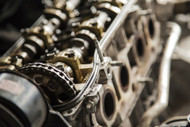Understanding Rod Knock: Key Insights on This Engine Issue
1st Aug 2019

What Is a Rod Knock?
When driving, do you hear a knocking sound coming from your vehicle's engine? If so, your vehicle could be suffering from a rod knock. It typically manifests as a low-pitched knocking sound that fluctuates depending on your vehicle's speed. As you accelerate, the knocking sound becomes faster and louder. As you decelerate, on the other hand, it becomes slower and quieter. While some drivers simply assume a bad serpentine is causing the sound, this typically isn't the case.
Overview of Rod Knock
A rod knock is a potentially catastrophic engine problem that occurs when one of the connecting rods -- which connects the piston head to the crankshaft -- creates metal-on-metal contact. In modern automotive engines, pistons move up and down to pump under the power of combustion. As the cylinders burn air and gas, they create pressure that moves the pistons. Over time, however, the protective bearings on these connecting rods can degrade, resulting in metal-on-metal contact that manifests as a rod knock.
What Causes Rod Knock?
Now for the million-dollar question: What causes rod knock? Most drivers will never encounter rod knock, as modern automakers design their engines to protect against metal-on-metal contact with the connecting rods. With that said, several factors can increase the risk of rod knock, one of which is lack of oil or infrequent oil changes.
Engine oil runs through the crankshaft to lubricate the connecting rods and surrounding metal. If too much oil leaks from the engine, there will be less lubrication on these components. Drivers can avoid this scenario by replacing their vehicle's engine oil every 3,000 to 5,000 miles or as recommended by their vehicle's automaker.
Another problem that increases the risk of rod knock is overheating. If you allow your engine to overheat, it may warp the connecting rods or other components, in which case metal-on-metal contact may occur.
How to Fix Rod Knock
Unfortunately, there's no quick or easy fix for rod knock. If a connecting rod is creating metal-on-metal contact, you'll need to take your vehicle to a trusted mechanic to have it professionally diagnosed. Depending on the severity of the rod knock, the mechanic may only have to replace a bearing. Alternatively, he or she may have to replace the entire rod. By fixing the problem as soon as possible, though, you can keep your vehicle roadworthy while minimizing the risk of debilitating damage in the process.

